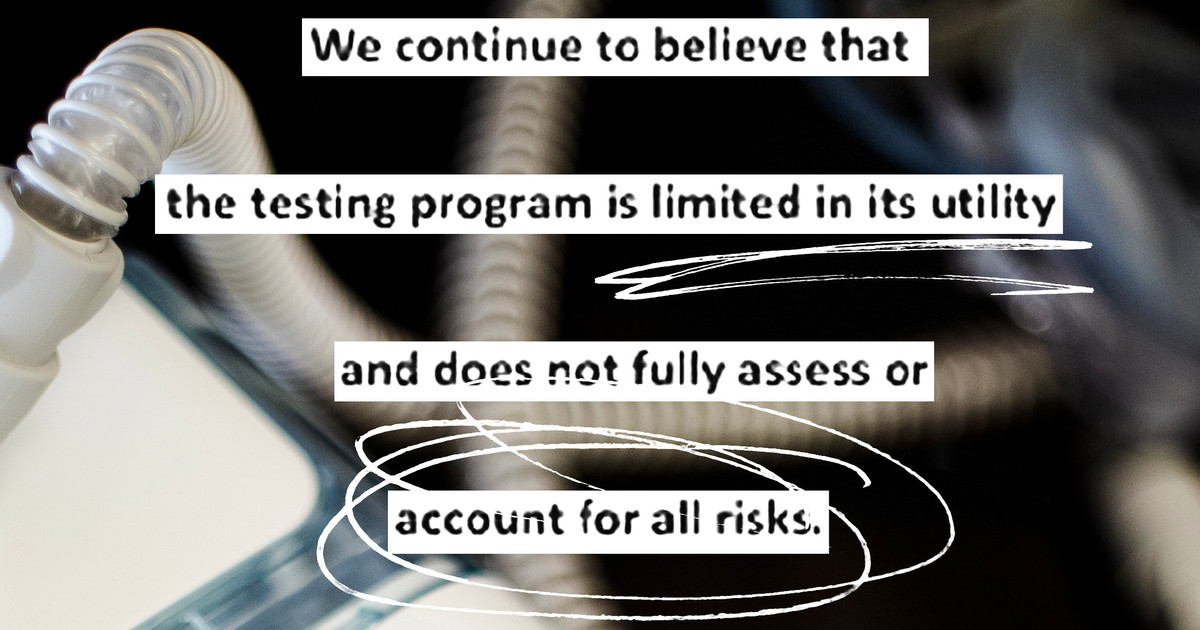As Philips reassured patients that millions of recalled machines were safe, internal emails show federal regulators privately told the company its testing didn’t account for the impact of long-term harm from tainted devices.
In the winter of 2021, with its stock price plunging, lawsuits mounting and popular breathing machines pulled from the shelves, Philips Respironics made a surprise public announcement.
The company said the sleep apnea devices it had recalled only months earlier had undergone new safety tests and did not appear to pose a health threat to the millions of patients who relied on them to breathe.
It was a remarkable reversal for the global manufacturer, which had drawn headlines after admitting that an industrial foam placed inside the devices could break apart in heat and humidity and send potentially toxic and carcinogenic particles and fumes into the masks worn by users.
The new results, Philips said, found the machines were not expected to “result in long-term health consequences.”
But a series of emails obtained by ProPublica and the Pittsburgh Post-Gazette show the Food and Drug Administration quickly rejected those safety claims, telling Philips that the new tests failed to account for the impact on patients who had used the devices for years. The FDA also said it still considered the machines a significant health threat that could inflict severe injury or even death.
“These tests are preliminary,” the agency told Philips. “Definitive conclusions cannot yet be drawn in support of reduction in hazards.”
The FDA did not publicize its assessment, even though patients across the country were at risk and an untold number continued using their recalled machines while they waited on Philips to send replacements.
At the time, the FDA made only one public reference to the dispute — on the fourth page of a 14-page letter to Philips in May 2022. To see it, customers would have had to find it on the agency’s website and then wade through scientific language about “cytotoxicity failure,” “novel continuous sampling” and other complex concepts.
What a terrible thing Philips has done here. A life-saving device killing the patient instead and the company denying as much as possible (as it is with many companies these days). As I age and possibly require such a device, it damn sure won’t be a Philips. This actually shakes my faith in all these CPAP devices if I am honest.
Here’s to hoping the FDA goes at them hard, but I won’t hold my breathe (sorry).
Love the lengths they were willing to go to over a few cents worth of shitty filter foam. This whole thing is a case study in corporate greed.
It’s not even filter foam. It’s sound damping foam to keep the machines quieter.
This is kind of frustrating, my mom has used one since about 2000, I don’t remember that one being loud but it made noise. How loud could they be? Maybe I shouldn’t complain as a non user.
The originals were so loud people would refuse to use them - not least because they would prevent anyone in bed with you from going to sleep.
Ah well probably relevant that my folks have slept in different rooms since early 90s and mom had already had a trip to the hospital relating to not breathing at night. Maybe the sound was easily overlooked and I just don’t remember it.
I was prescribed a CPAP about 6 months ago and while researching which one to get, I came across ProPublica’s reporting on Phillips who are usually one of the more trusted brands. This whole thing has definitely made me rethink getting one. Much to my wife’s chagrin, since she has to suffer through my snoring.
If a (formerly) reputable brand has this issue, what does it mean for the lesser known brands?
I likely need one soon and and looking for non-Philips devices. Maybe ResMed?
Just because a reputable brand has an issue doesn’t mean lesser ones have it too, they might be full grown corporate scumbags yet. Hopefully Philips gets slapped around so hard by the FDA for this that they’ll serve as an example to the rest of the industry.
I’ve worn out my “X to doubt” button though, but a guy can dream (if he doesn’t suffer from sleep apnea)
deleted by creator
Gosh, my mom has used one of these for roughly 25 years. There weren’t options then, but I wonder what she uses now. I’ll have to ask. Dad has one now, also.





